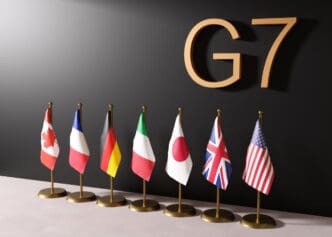The G7 summit in Canada this week is being overshadowed by the sudden escalation of conflict in the Middle East, with Israel’s decision to attack Iran forcing world leaders to reshuffle their agenda. Initially set to focus on Russia’s war against Ukraine and President Donald Trump’s tariff policies, the three-day meeting in the Rocky Mountains is now primarily centered on the Israel-Iran conflict.
The summit, hosted by Canadian Prime Minister Mark Carney, was intended to commemorate the G7’s 50th anniversary with discussions on energy security, digital transition, and forest fire management. However, Israel’s military action has obligated the Group of Seven, comprising the United States, Canada, the United Kingdom, France, Germany, Italy, and Japan, to address this urgent geopolitical issue.
Diplomatic correspondent James Landale reports that while the U.S. might not have explicitly endorsed the strikes, President Trump is considered the key influencer on Israeli Prime Minister Benjamin Netanyahu. This underlines the delicate role the U.S. plays in navigating such conflicts. Divergent views among the G7 members have emerged, with some leaders like UK Prime Minister Sir Keir Starmer and French President Emmanuel Macron calling for de-escalation, while Japan’s Prime Minister Shigeru Ishiba has criticized Israel’s actions.
Prime Minister Carney had hoped to avoid contentious topics and had even planned to forego a final communiqué to prevent textual disputes as seen in previous summits. Yet, with the current situation, discussions have inevitably veered towards managing the Middle East conflict, and the economic ramifications, particularly regarding oil prices, are a pressing concern.
President Trump, having praised Israel’s actions, is now a focal point at the summit, balancing his preference for bilateral engagements with the need for multilateral cooperation. His administration’s stance on tariffs, especially those affecting G7 allies, is also under scrutiny, with leaders urging him to consider the broader implications of economic hardship on allied nations when addressing challenges posed by China.
Ukraine remains a critical issue, with President Volodymyr Zelensky joining the talks to discuss strategies in pressuring Russia. The G7 aims to reduce Russia’s oil revenue by lowering the cap on crude oil prices and enforcing new sanctions, though there is uncertainty regarding President Trump’s position on these measures.
The summit serves as a reflection of the existing tensions within the G7, questioning the relevance of these gatherings in the current political climate. Despite the challenges, leaders are striving to maintain cohesion and address pressing global issues effectively.








